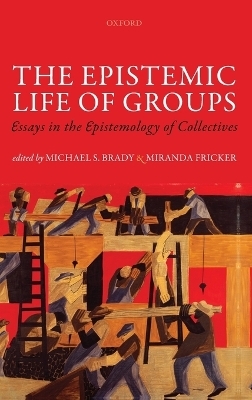
The Epistemic Life of Groups
Oxford University Press (Verlag)
978-0-19-875964-5 (ISBN)
Social epistemology has been flourishing in recent years, expanding and making connections with political philosophy, virtue epistemology, philosophy of science, and feminist philosophy. The philosophy of the social world too is flourishing, with burgeoning work in the metaphysics of the social world, collective responsibility, group action, and group belief. The new philosophical vista now more clearly presenting itself is collective epistemology--the epistemology of groups and institutions.
Groups engage in epistemic activity all the time--whether it be the active collective inquiry of scientific research groups or crime detection units, or the evidential deliberations of tribunals and juries, or the informational efforts of the voting population in general--and yet in philosophy there is still relatively little epistemology of groups to help explore these epistemic practices and their various dimensions of social and philosophical significance. The aim of this book is to address this lack, by presenting original essays in the field of collective epistemology, exploring these regions of epistemic practice and their significance for Epistemology, Political Philosophy, Ethics, and the Philosophy of Science.
Michael Brady is Professor of Philosophy at the University of Glasgow. His research centres on the philosophy of emotion, and its links with moral philosophy and epistemology. In 2013 his book Emotional Insight was published by Oxford University Press. He is currently Co-Investigator on a major interdisciplinary project on the Value of Suffering at Glasgow. He was Director of the British Philosophical Association, having previously served as Secretary of the Scots Philosophical Association. Outside of academia, he has acted as a philosophical advisor on a number of productions by the Manchester-based theatre company Quarantine. Miranda Fricker is Professor of Philosophy at the University of Sheffield. Her research is in ethics, social epistemology, and feminist philosophy, with occasional forays into political philosophy. She is the author of Epistemic Injustice: Power and the Ethics of Knowing (OUP, 2007); co-author and editor of Reading Ethics: Selected texts with interactive commentary (Wiley-Blackwell, 2009) with Sam Guttenplan; and co-editor of The Cambridge Companion to Feminism in Philosophy (CUP, 2000) with Jennifer Hornsby. She is Director of the Mind Association, and an Associate Editor of the Journal of the American Philosophical Association.
1: EPISTEMOLOGY; 2: ETHICS; 3: POLITICAL PHILOSOPHY; 4: PHILOSOPHY OF SCIENCE
| Erscheint lt. Verlag | 10.3.2016 |
|---|---|
| Reihe/Serie | Mind Association Occasional Series |
| Verlagsort | Oxford |
| Sprache | englisch |
| Maße | 162 x 240 mm |
| Gewicht | 532 g |
| Themenwelt | Geisteswissenschaften ► Philosophie ► Erkenntnistheorie / Wissenschaftstheorie |
| Geisteswissenschaften ► Philosophie ► Ethik | |
| Naturwissenschaften | |
| ISBN-10 | 0-19-875964-9 / 0198759649 |
| ISBN-13 | 978-0-19-875964-5 / 9780198759645 |
| Zustand | Neuware |
| Haben Sie eine Frage zum Produkt? |
aus dem Bereich

![Was heißt Denken?. Vorlesung Wintersemester 1951/52. [Was bedeutet das alles?] - Martin Heidegger](/media/113619842)
